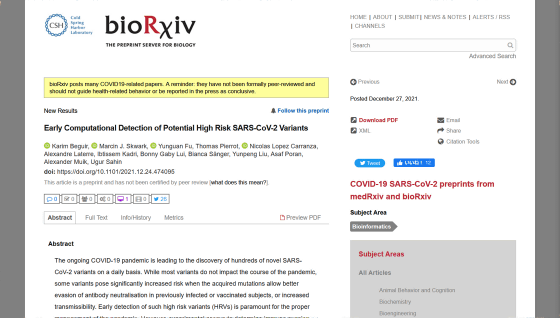BioNTech develops AI system to identify 'high-risk mutant strain' of new coronavirus about two months earlier than WHO

Early Computational Detection of Potential High Risk SARS-CoV-2 Variants | bioRxiv
https://www.biorxiv.org/content/10.1101/2021.12.24.474095v1

BioNTech and InstaDeep Developed and Successfully Tested Early Warning System to Detect Potential High-Risk SARS-CoV-2 Variants | BioNTech
https://investors.biontech.de/news-releases/news-release-details/biontech-and-instadeep-developed-and-successfully-tested-early/
BioNTech has developed a method to predict new high-risk variants of COVID-19 | The Hill
https://thehill.com/changing-america/well-being/medical-advances/589282-biontech-has-developed-a-method-to-predict-new
Of the new coronavirus variants reported daily by researchers around the world, some variants have a significant impact on the epidemic situation. WHO has compiled reports from research teams around the world to identify particularly dangerous variants as 'Variants of Concern', 'Variants of Interest' and 'Variants Under Monitoring'. to '(a mutant strain should be VUM / monitoring) has been selected .
Among them, the 'variant of concern' is significantly different from the conventional strain in terms of infectivity and severity, and so far ' alpha strain ', ' beta strain ', ' gamma strain ', ' delta strain ', and ' Omicron strain ' have been designated. increase. Detecting these high-risk mutants and taking countermeasures is important to prevent the spread of infection, but researchers analyze the risk after the mutant is first reported, and WHO is a high-risk mutant. There is a time lag before it is certified.
So Germany-based BioNTech has collaborated with InstaDeep , an AI system developer, to develop an 'early alert system' for early detection of high-risk mutants. BioNTech says AI-powered early warning systems can quickly analyze the gene sequence data of the new coronavirus that is available worldwide and flag high-risk mutants faster than human researchers. Insist.

The newly developed early alert system is based on structural modeling of the interaction of viral spike proteins with receptor cells and indicators that score the virus's antigenic escape properties and health effects. AI-based predictive modeling will analyze the vast amount of new coronavirus gene sequence data reported by researchers around the world to assess how much risk a particular variant poses.
To test the capabilities of the early warning system, the research team conducted experiments from September 2020 to November 2021. As a result, 12 of the 13 strains designated by WHO as 'variant of concern', 'variant of concern' and 'mutant of concern' were 'high-risk mutants' on average two months earlier than WHO's designation. I was able to flag it as a 'stock'. BioNTech reports that Omicron strains, which are also threatened in Japan, were flagged on the first day when gene sequence data became available.
BioNTech co-founder and CEO Uğur Shahin uses a newly developed advanced method to analyze the sequence information of peplomer proteins and risk mutant strains according to scores such as predicted antigenic escape characteristics. Claims to be detectable. 'Early detection of potentially high-risk mutants is an effective means of alerting researchers, vaccine developers, health authorities and policy makers, and responds to new mutants of concern. You can save more time. '
Karim Beguir, co-founder of InstaDeep, said, 'Currently, more than 10,000 new mutant gene sequences are discovered each week, but human experts can't handle complex data of this scale. It's impossible. We tackled this challenge by combining the powerful AI capabilities of InstaDeep's platform with BioNTech's SARS-CoV-2 know-how and technology. '
Related Posts:
in Science, Posted by log1h_ik







